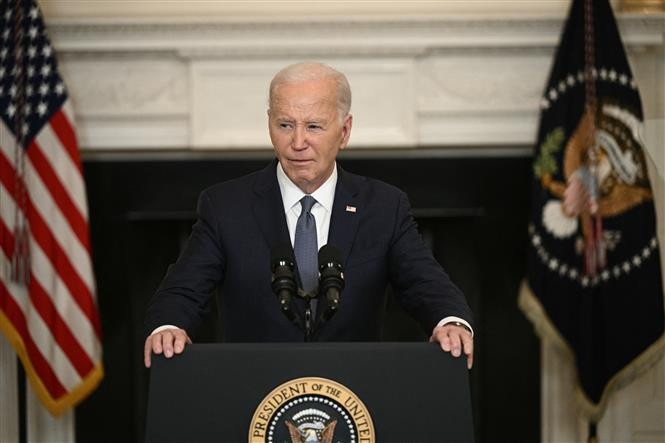An adviser to Prime Minister Benjamin Netanyahu confirmed on June 2 that Israel has accepted a framework agreement to ease the war in Gaza that was previously proposed by US President Joe Biden.

In an interview with the British newspaper Sunday Times, Ophir Falk, Prime Minister Netanyahu's chief foreign policy adviser, said President Biden's proposal was "a deal that we agreed to." However, he described it as a deal that still had shortcomings and needed more work.
“There are still many details to be worked out,” adviser Ophir stressed, adding that Israel’s conditions, including “the release of hostages and the destruction of Hamas as a genocidal terrorist organization,” remained unchanged.
Earlier on May 31, President Biden announced a three-phase plan to end the war in Gaza.
The first phase would last for six weeks and include a "full and complete" ceasefire, with Israel withdrawing its forces from all populated areas in Gaza and releasing a number of hostages including women, the elderly and the wounded in exchange for the release of hundreds of Palestinian prisoners.
During this phase, Palestinian civilians will return to their homes and neighborhoods in all areas of Gaza, while humanitarian assistance will increase to 600 aid trucks entering Gaza every day. The first phase will also include negotiations between Israel and Hamas to move forward with the next phase of the proposal.
The second phase is described by President Biden as “a permanent cessation of hostilities.” However, the leader added that negotiations to reach the second phase could take more than six weeks because of differences between the two sides. The US, Qatar and Egypt will ensure that negotiations continue during this time until “all agreements are reached” to begin the third phase. According to Mr. Biden, in the second phase, all surviving hostages will be released, including male soldiers.
In the third phase, President Biden said he would begin implementing a major reconstruction plan for Gaza and the remains of the dead hostages would be returned to their families.
The Gaza reconstruction deal would also include Arab states and the international community to ensure Hamas does not rearm. President Biden added that Washington would work with partners to rebuild homes, schools and hospitals in Gaza, where the war has displaced nearly 2.3 million people and caused widespread famine.
President Biden has repeatedly proposed ceasefire plans similar to the one proposed on May 31, but they have all failed. In February, he said Israel had agreed to halt fighting during Ramadan, the Muslim holy month that began on March 10. But no such ceasefire has taken hold.
The key issue is Israel's insistence that it will only discuss a temporary halt to fighting until Hamas is defeated. Hamas, for its part, shows no signs of surrendering and believes that freeing the hostages is the only way to end the war permanently.
Adviser Ophir reiterated Prime Minister Netanyahu's position that "there will be no permanent ceasefire until all our objectives are met."
Prime Minister Netanyahu is also under pressure to maintain his coalition government. Two far-right partners have threatened to oppose any deal they see as favorable to Hamas. A moderate partner, former general Benny Gantz, wants the deal reviewed.
The Islamist movement Hamas has tentatively welcomed President Biden’s initiative. “President Biden’s speech contains positive ideas, but we want this to materialize within the framework of a comprehensive agreement that meets our demands,” a Hamas official, Osama Hamdan, told Al Jazeera on June 2.
Hamas wants guarantees of an end to the Gaza offensive, a full Israeli withdrawal, free movement of Palestinians and reconstruction aid.